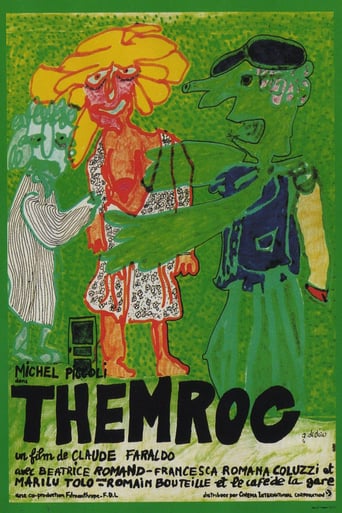MARIO GAUCI
This is mainly noted for having no intelligible dialogue throughout: given its considerable length (105 minutes) and essential plotlessness, though, the series of grunts, growls, groans and other gibberish uttered by all the characters involved does become wearying after a while. Nevertheless, it's a good example of the risks that film-makers were willing to take (and generally manage to pull off) during this most creative era in World Cinema; curiously enough, for being virtually a Silent film with barely established characters, this has one of the longest cast lists I've ever seen! THEMROC revolves around a laborer (Michel Piccoli) who goes berserk after getting the sack from work: he sleeps with his sister and destroys his apartment and, after the initial astonishment, his neighbors get the same anarchic bug. This streak of non-conformism also extends to sex (with plenty of non-graphic nudity on display), as Piccoli contrives to elicit uninhibited behavior from many of the females (be they nubile or frustrated) around him – including the secretary, Marilu' Tolo, he had been caught unwittingly peeping on and subsequently seduced. Despite the occasional brutality, police intervention in the matter largely proves ineffectual. Though the point of it all is obscure – unless it's that one needs to revert to some form of primeval state in order to survive the exigencies of the modern world – a handful of situations which crop up are definitely amusing: Piccoli and policeman Patrick Dewaere engaging in a tit-for-tat routine while the latter is rebuilding the façade of his apartment; feeling liberated, a victimized wife tries to assert herself and finally escapes her husband's tyranny through the window when he's not looking; a man spends practically the entire film lovingly washing his car but, then, at the very end he joins in the chaos by nonchalantly taking a sledge-hammer to it. Still, when all is said and done, the best thing about the film is its extraordinary fragmented editing.
robtclements
In a time when blind respect for anyone with the arrogance to call themselves an authority has reached plague proportions, we need to rediscover Claude Faraldo's anarchist assault Themroc as a matter of extreme urgency. Whether as a surrealistic revenge fantasy that makes Dirty Harry look like Kindergarden Cop or simply as one of the funniest films ever made, the film takes nothing seriously (least of all itself) as it sets out to outrage every convention of decent law abiding filmmaking ever unwritten. It's hard to choose just one pristine moment to symbolise this work - peraps the gendarme's blind pride in the stupidity of his uniform just before he becomes Themroc's latest meal; or possibly Michel Piccoli's curious assistance in his own death as his cave family are carefully walled in - but the work is blistering in its uncompromising joyous anti-logic. Commercial traditionalists like Bunuel may have made newer - even angrier - statements; but noone has ever revelled in their own extremism than Faraldo. The sooner it turns up on DVD, the better.
dbdumonteil
That's what John Lennon once said.Themroc is would be avant-garde,but only for these who have a short memory.Take the beginning of the movie:these herds going to work ,the hero's tiny and seedy flat,they already were in King Vidor's "the crowd" (1928).Actually Claude Faraldo contents himself with recycling the most dated clichés of the post May 68 era:down with the bosses,power to the people,kill (and eat) the cops,this is a brand new life ,opportunity knocks,make love not war,we are the good guys,the others are the villains,please get out of the new road if you can't lend a hand,and so on.Spitting on the cops was so à la mode that Faraldo could not be wrong while speaking to the intellectual post 68 elite :humble people are actually demeaned in his film.How to attract people's attention?Which form should he use? That's Faraldo's lucky break!No form at all, a formless product.So it seems that he has filmed haphazardly,then asked his editor to work in a "surrealistic " way(He was not aware that Luis Bunuel had already done that ,as far as editing is concerned- un chien andalou (1928) l'âge d'or (1930);his movies were as subversive as Faraldo's ,and at a time when it was not that much trendy.Bunuel wasn't born to follow).People who like this -and they seem to be quite a lot- should catch Jacques Doillon 's "l'an 01",which deals with the same clichés,but which is less pretentious :it could be,relatively speaking,a seventies update of Jean Renoir's "la vie est à nous" (1936).
rband
I saw this movie while I was living in Germany in 1975 and absolutely LOVED it - but of course, that was 25 years ago. I've searched in vain for it since, I don't think it's ever been shown in the States.Note to the distributor: there's an opportunity for it in the art houses on this side of the Atlantic - granted Americans are generally much more prudish than Europeans, but I think we're sufficiently post-PC (politically correct) that it would have a chance at a good reception.


